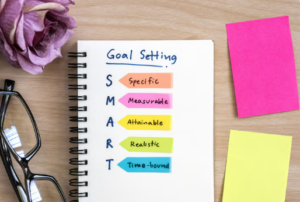Investigating Goals

This page provides general information about a learning activity that’s common in many Educational Planning courses.
Since educational planning course content depends on the mentor/advisor and the student, understand that your course may have different and/or specific expectations related to this topic.
Goals and Educational Planning

Identifying goals is an important learning activity in planning a degree, and it’s one of the first ones you may complete.
One of the major goal-related questions to ask is “why am I pursuing this degree?” The answer to that sets the context for making decisions about degree focus and content.
For example, if you are pursuing a degree to get a promotion at work, you might decide on a degree area and concentration related to the job you aspire to gain. If a secondary personal goal is to learn more about other cultures, you might decide on including general education courses that address this goal (e.g., Spanish, Families in Global Perspective, Native American Histories and Cultures).
Also, research studies have linked goals to motivation, which leads to achieving outcomes.
Locke and Latham (1990) developed the Goal-Setting Theory of Motivation (GSTM), which posits that individuals’ performance can be predicted by the motivation process, which entails a conscious self-regulation mechanism that derives from the following cognitive determinants: (a) valuing a certain goal; (b) desiring to pursue the goal; and (c) intending to engage persistently in efforts to achieve the goal. The quality and number of the goal-directed behaviors serve as determinants that contribute to individuals’ performance and future outcomes (Latham, 2003; Latham & Locke, 1991; Lunenburg, 2011). [1]
As you can infer, an important step toward a positive outcome with your degree is to set goals that contribute to motivation and planning your education.
Some Goals Questions to Consider
Personal Goals
- Why do you want to pursue a degree?
- What type of degree (associate, bachelor’s) do you want to pursue?
- How do you intend to use your degree?
- What knowledge, qualities, and characteristics do you hope to develop through your studies?
Academic Goals
- Do you want/need to strengthen any academic skills? (e.g., writing, math, research)
- What do you want to learn about in your degree?
Professional Goals
- Where would you like to be professionally in both the next few years and long-term?
- Are there studies that you can include in your degree to help you to reach your professional goals?
Goal-Setting Resources

One of the best ways to consider and create goals is to make them “smart.” SMART is an acronym for:
- S = Specific
- M = Measurable
- A = Achievable
- R = Realistic/Relevant
- T = Time-bound
The following video explains SMART goals using an extended example about improving one’s health. (Note that the animation and narration start 15 seconds into the video.)
These resources provide additional help for writing SMART goals.
- SMART Goals Worksheet from Lake Superior State University
- Goal Setting: SMART Goals from Iowa State University
This short video describes how to use a goal-setting worksheet to identify a goal and develop a strategy for accomplishing it.
Key Takeaway – Looking Forward
You may eventually explain your goals – the context in which you’re pursuing your degree and your aims for your degree – in the rationale essay that accompanies your degree plan.
- Lee, A. (2024), The Relation between Motivation and Goal Attainment: A Correlational Meta-Analysis. Jpn Psychol Res, 66: 114-137. https://doi.org/10.1111/jpr.12486 ↵
